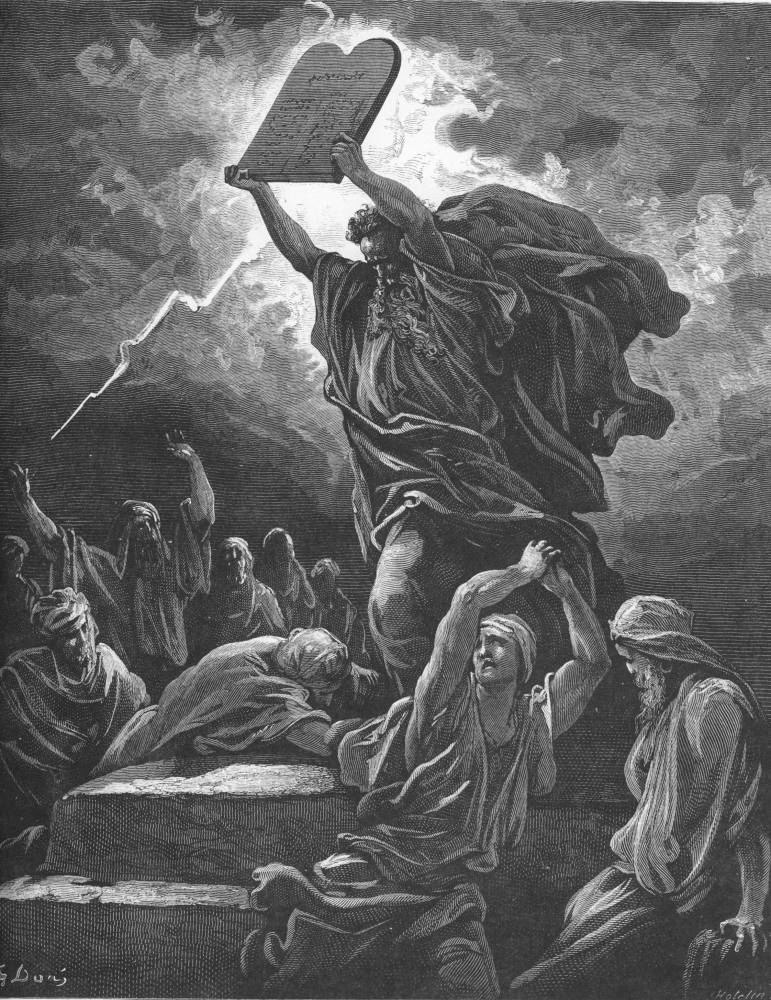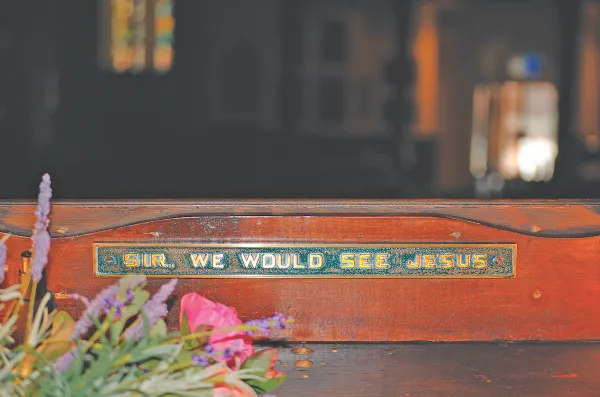The Law on the Wall

Why the Ten Commandments Don’t Belong in Your Public School
In June 2025, Texas Governor Greg Abbott signed Senate Bill 10, requiring every public school classroom in the state to post a framed, 16×20-inch copy of the Ten Commandments by September. Supporters hailed it as a victory for “Christian values.” Opponents filed lawsuits before the ink was dry.
Texas is not alone. Louisiana, Arkansas, and other states have tried the same. These efforts are part of a long-storied push to reclaim some imagined moral order by placing ancient stone-etched commandments back in the public square — this time in bold font and a ready-made frame, courtesy of the state.
You might expect me, as a Christian pastor, to be in favor of this sort of thing.
But I’ll be honest: I have never understood the impulse to post the Decalogue in our nation's schools and courthouses.
My objection has nothing to do with the typical “church vs. state” debate where this issue is usually fought. My concern runs deeper — not political, but theological.
Because the desire to post the Ten Commandments in public buildings sends a completely backwards message, and it undermines the entire central premise of the Christian faith.
So I offer the following for your consideration:
Premise 1: Christianity Begins Where the Law Fails
The irony here is thick. Some Christians want to insist that we place our nation under God's Law.
But the entire central premise of Christianity is that no one can keep God's Law.
The argument is not that the Law is bad — it’s that we are. The Law is good, righteous, and holy. But the entire point of the gospel is that no one can keep it. That’s literally why Christ came!
“For by works of the law no human being will be justified in his sight, since through the law comes knowledge of sin.”
— Romans 3:20
“If righteousness were through the law, then Christ died for no purpose.”
— Galatians 2:21
In other words: If the Law of Moses could fix us, Jesus didn’t need to die.
But it couldn’t.
So He did.
When Christians campaign to hang the Ten Commandments on classroom walls or in courtrooms as if they’re a moral cure-all, we’re not upholding the gospel — we’re replacing it. We’re taking what Paul described as a ministry of death (2 Cor. 3:7), and dressing it up like it’s the solution to our national decline.
But the Law was never meant to save us. It was meant to expose us.
It functions more like a mirror than a medicine cabinet: it shows us what’s wrong, but it can’t make us right.
The moment we use it as a bludgeon — a tool to make people behave — we abandon its biblical purpose and exchange grace for moralism.
So here’s the core problem:
Placing people under the Law is the literal opposite of Christianity.
The gospel doesn’t say, “Be better.”
It says, “You can’t. But Jesus was — for you.”
Until we get that straight, we’ll keep confusing cultural influence with gospel clarity — and keep pushing a message that, despite maybe having good intentions, has no power to change people's values or behaviors.
Premise 2: The Apostle Peter Already Dealt With This
This isn’t a new problem.
In Acts 15, the early church faced a theological crisis. A growing number of Gentiles were turning to Christ, and some Jewish believers insisted that these new converts should follow the Law of Moses.
The debate was fierce. This wasn’t just about culture — it was about salvation. Was Jesus enough, or did people need Jesus plus the Law?
And then Peter stood up and dropped the hammer:
“Why are you putting God to the test by placing a yoke on the neck of the disciples that neither our fathers nor we have been able to bear?”
— Acts 15:10
Read that verse again. I promise it's a good one.
Translation:
Why are we trying to make others carry what we ourselves couldn’t?
Peter knew the Law. He loved it. But he also knew it couldn’t save — it could only convict. The yoke of the Law was too heavy for even the most devout Israelites to bear. So now that Christ had fulfilled it, Peter asks the obvious question:
Why would we take the very weight Jesus came to remove, and put that weight back on anyone’s shoulders?
It’s a question that still preaches.
Because this is exactly what modern Christians are doing when we try to legislate the Law into secular spaces. We are re-strapping the yoke.
We are putting people under a covenant they were never part of — and we’re doing it in the name of Christ, who came to lift that burden, not reimpose it.
Worse, we’re sending a message to the world that Christianity is just another moral code, another rule-book, another religion telling people to clean themselves up.
But Peter makes it plain: even we couldn’t carry this.
The Law of Moses was never meant to be the centerpiece of the Christian life. Christ is.
The Church settled this in Acts 15. It’s baffling that we’re still trying to reopen the case.
Premise 3: The Law Is Not the Gospel
When Christians campaign for Ten Commandments displays, we need to ask:
What message are we really sending?
We’re not saying, “Come to Jesus.”
We’re saying, “Behave.”
And that’s such a bizarre suggestion from people who, in becoming Christians, had to first confess our own inability to behave.
We had to admit our helplessness to keep God’s Law — and cast ourselves entirely on Jesus, the only One who ever did.
We didn't need to behave better. We needed to be forgiven.
“He forgave us all our trespasses, by canceling the record of debt that stood against us… This he set aside, nailing it to the cross.”
— Colossians 2:13–14
The Law was that record of debt — the written code that (rightly!) condemned us.
And Jesus didn’t bronze it.
He didn’t post it.
He nailed it to the cross.
So why are we so determined to nail it to the wall?
We keep trying to display the Law,
But Christ already came to destroy its power over us.
Not by erasing its truth — but by fulfilling it, and bearing its penalty in our place.
This doesn’t mean the Law is bad. Paul is clear:
“The Law is holy, and the commandment is holy and righteous and good.” (Romans 7:12)
But again, that’s exactly the problem:
The Law is good — and we’re not.
God's Law is a mirror, not a ladder. It shows us how far we fall short — but it can’t lift us even an inch closer to God.
So when we post it as a public moral solution — stripped from its redemptive context — it doesn’t bring salvation. It brings shame, self-righteousness, or despair.
It either demoralizes, or worse — deceives, making people think that external morality is what God is really after.
And if that’s the message we’re sending, we’re not preaching Christ at all.
Because Christian witness is not about legislating behavior.
It’s about proclaiming grace.
The church isn’t here to make bad people behave better.
It’s here to announce that dead people can be made alive.
If You Still Want to Hang the Ten Commandments…
If you still want to post the Ten Commandments, let me suggest a better reason:
Hang them the way Berlin displays what remains of the Wall.
After the fall of the Berlin Wall in 1989, cities around the world preserved jagged fragments of it — not as a tribute, but as a warning. They didn’t frame those slabs in gold and say, “Wasn’t that great?”
They kept them to say: “Never again.”
The Wall was a monument to division. To a failed system. To a burden too heavy to stand forever.
Sound familiar?
If you're going to display the Ten Commandments, let it be like that — not as a symbol of cultural triumph, but as a sober reminder of something we could never keep.
Let it remind us that the Law stood against us — and that Jesus stood in our place.
He fulfilled it.
He bore its curse.
He nailed its accusations to the cross.
So if we’re busy nailing the Law to the wall, while ignoring the One who nailed it to the cross, let’s be honest:
We’re not reclaiming Christian values.
We’re rejecting the very heart of the Christian faith.
Because Christianity isn’t about moral monuments.
It’s about a crucified and risen Savior.
And the only thing we should be eager to hang in our public square
is the good news of His grace.



